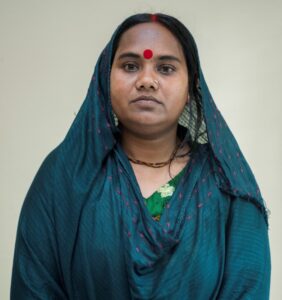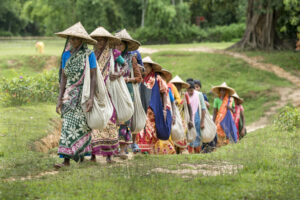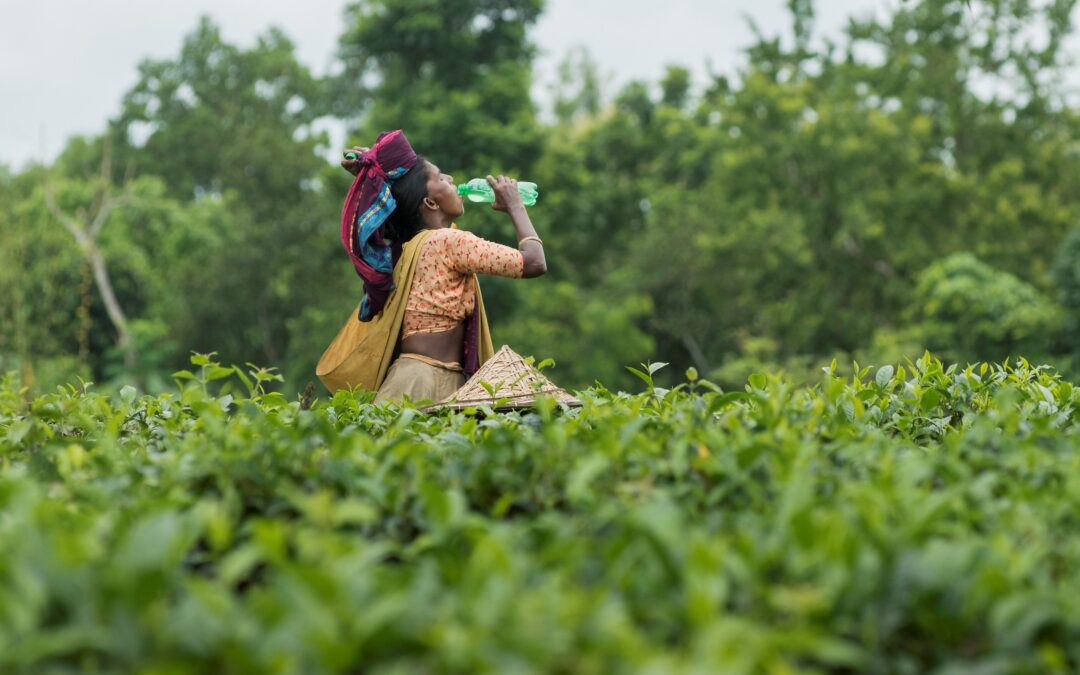At the end of a day picking tea leaves under the July sun, women walk from the hilly fields down an embankment and into a muddy stream, fully clothed, to bathe before they return to their company-provided tin homes where they prepare dinner for their families.
The tea estate workers in Sreemangal, Bangladesh, say their work is much harsher now due to increased heat and more torrential rains. The changing climate also means that picking the daily quota of tea leaves, always difficult, is sometimes impossible. And when they cannot meet their quota, they are paid even less than their already meager wages.

Sreemati Bauri, a Bangladesh tea worker and union leader. Credit: Solidarity Center / Hasan Zobayer
“It often happens that in a heat wave, it’s a hardship to meet the daily quota [up to 25 kilos, 55 pounds] of tea leaves, and so they can’t make the daily wage of 170 taka ($1.55),” says Sreemati Bauri, a tea estate field supervisor and union leader.
“It’s already difficult to live with this little amount of money. If a worker can’t make their daily target, it’s difficult to survive. Due to the heat, it has become too hot for them to get their wage,” she said, speaking through an interpreter. Bauri, an executive member of the Jurivally Executive Committee, part of the Bangladesh Cha Sramik Union, supervises 300 women who walk long distances across tea fields each morning before they start picking leaves.
“The heat is more excessive than before,” says Sumon Kumar Tant, a field supervisor and union member. “They have to work under scorching sun. It’s as if they have to carry two times the burden—one the burden of tea leaves on their back, and the other, the weight of the heat.”
Better Working Conditions at Unionized Tea Estates

Bangladesh tea workers walk long distances across fields on their way to pick tea leaves. Credit: Solidarity Center / Gayatree Arun
“At higher temperatures and prolonged periods of exposure, heat stress can lead to exhaustion, it can lead to permanent disability, it can even lead to death,” says Sophy Fisher, discussing the findings of an International Labor Organization (ILO) report on the impact of heat stress on workers. And women are disproportionately affected by the impacts of rising heat due to the type of work they perform and physical issues such as pregnancy, according to a new study.
Climate change-related hardships add to tea workers’ already precarious working conditions. An estimated 13 million people in 48 countries work on tea plantations around the world, mostly women who are paid low wages and have few or no health and safety protections, including safeguards to prevent and address sexual harassment and other forms of gender-based violence. Tea plantation workers often are forced to rely on their employers for food, housing and education, adding to their vulnerability.
“Tea workers give a lot of sweat for their work,” says Bauri.
Workers in the Bangladesh Cha Sramik Union, a Solidarity Center partner, have achieved workplace improvements not offered at nonunion plantations, with employers required to provide daily hour-long lunch breaks and a medical facility. Tant cites the rapid benefit payment by a company to the family of a tea picker killed on the job by a falling tree branch as an example of how the union’s intervention ensured proper compensation.
Still, more progress must be made, he said, citing the need for pregnant workers to get more time off than the four months’ paid maternity leave granted under the country’s labor law.
Little Accountability Global Tea Supply Chain

Bangladesh tea worker, Sanchari. Credit: Solidarity Center / Hasan Zobayer
Rooted in colonial era exploitation, tea plantations are rife with worker rights abuses. Accountability in the global tea supply chain is particularly lacking, with a recent report finding few corporations willing to provide the information necessary to determine how workers are treated and little due diligence across the supply chain.
A lack of supply chain transparency means companies are not being held to account for violations, says Kate Jelly, author of the Business and Human Rights Research Center (BHRRC) report, Boiling Point: Strengthening Corporate Accountability in the Tea Industry. “Many companies maintaining opaque supply chains are able to distance themselves from human rights abuses,” she told Reuters.
Based on research into news stories from 2022, the report found human rights abuses in Bangladesh and four other countries involving low or unpaid wages, lack of safety and health protections, and employer intimidation of workers seeking to improve their workplaces through unions.
Involving workers in the due diligence process is essential for supply chain transparency, according to Natalie Swan, a BHRRC labor rights program manager. “That means not relying on certification, not relying on a human rights policy or a supplier code of conduct.”
Solidarity Center believes workers must be at the center of workplace solutions, including those involving climate justice, in which the needs of workers and their communities are involved in achieving a fair or just transition to a more equitable and sustainable economy to mitigate the impacts of climate change and enable adaptation for impacted communities.

